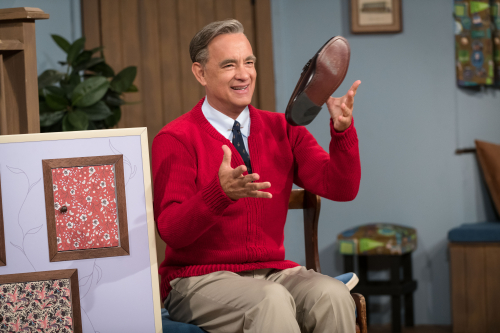
Lacey Terrell/TriStar Pictures
MOVIE REVIEW
A Beautiful Day in the Neighborhood (2019)
This is Marielle Heller’s third movie, and with it she confirms her status as one of the finest directors now working. Her first movie, “Diary of a Teenage Girl,” told the difficult story of a clever 15-year-old who voluntarily begins sleeping with her mother’s boyfriend. Her second, “Can You Ever Forgive Me?,” showed how a writer who had lost her way was able to find herself again by co-opting other people’s voices. And now, with this movie that is not quite about beloved television host Fred Rogers, she gives us the road map to become better people. It’s an extraordinary achievement.
It’s not quite a perfect one, however. The movie expects us to care a great deal about a misanthropic magazine journalist named Lloyd (Matthew Rhys), who is a new father and a preoccupied husband to Andrea (Susan Kelechi Watson, quietly charming). At his sister’s wedding, he ends up in a fistfight with his deadbeat father Jerry (Chris Cooper, as reliable a character actor as ever was), so must go to his first meeting with Rogers (Tom Hanks) with bruises on his face.
It is not a spoiler to reveal that during the time they spend together for the magazine profile, Mr. Rogers’s example cracks something open in Lloyd, enabling him to be a better person. Only Mr. Hanks – who has radiated unassuming goodness for his entire career – could have lived up to this, and he plays his part wonderfully. But anyone who remembers the TV show “Mister Rogers’ Neighborhood” won’t need much emotional prompting to adore this film. There is a scene in the New York subway, where Lloyd has followed Mr. Rogers with some astonishment, which ends up with the entire subway car serenading Mr. Rogers with his show’s theme song. That pure radiant love from absolutely everyone in that car, where everyone knew the words, is not something any other celebrity could have achieved.
But perhaps only Ms. Heller could have done the scene in the Chinese restaurant, which takes the movie from a viewing experience to a lived one. Mr. Rogers and Lloyd are beginning to eat as finally Lloyd explains why he is so angry at his father. Mr. Rogers puts down his chopsticks and settles his entire attention onto him. He asks Lloyd to join him in taking a minute to think about everyone “who loved you into being.” And the noise on the soundtrack stops. Slowly everyone onscreen in the restaurant stops and also begins to think. And if you see this movie in the cinema – which for this scene alone you should – you’ll realize that everyone else around you is also holding their breath and thinking about the same thing.
There are not enough superlatives to heap upon the team that created this. To stop the movie in its entirety and give the audience the chance to participate in the healing being offered to Lloyd, and to create a sensation so visceral you can feel it in the cinema, is so breathtaking an achievement that I must implore you to go and experience it for yourself.
The rest of the plot – man must learn to love his father while he still can, and to be a good father and husband himself while he must – is worthwhile; and Mr. Rhys is a terrific everyman who realizes a cynical mindset is not always appropriate. It would have been wonderful to learn more about where Mr. Rogers himself came from, not just on the steps (prayer, swimming, playing the piano) he took on a daily basis to maintain such goodness and calm. But “A Beautiful Day in the Neighborhood” focuses on the person who needs to grow. Mr. Rogers (and Mr. Hanks) is already there. If his career keeps going as it has been, Mr. Rhys will be there pretty soon.
The movie has a few other tricks up its sleeves, too; all the tracking shots of places, such as the Pittsburgh suburbs or the George Washington Bridge are done with models that resemble those at the start of “Mister Rogers’ Neighborhood.” The staging is confident and the late-’90s fashions are painfully accurate. Some of the faux-documentary footage looks like C. G. I. was melded over footage shot back then; either that or cinematographer Jody Lee Lipes went the extra mile. But the women in the movie, including Christine Lahti as Lloyd’s editor, Wendy Makkena as Jerry’s new wife, Maryann Plunkett as Mrs. Rogers, and Jessica Hecht in a crucial single scene, are underserved – although Ms. Heller’s tendency to cast actors better known for television against type mitigates that a little. And it would have been nice to see at least one of the conversations between Andrea and Mr. Rogers for ourselves.
But that’s nitpicking against the larger message, purpose and success of this movie. Mr. Hanks and Ms. Heller have reinforced the thoughtful excellence we have come to expect from them and given us a gift: based on Mr. Rogers’s example we, too, can be better people. The experience of watching a movie is almost never like this.
Comments